Reading log
The long-awaited tell-all of when I read, what I read. Ordered from latest to oldest, so in order of how much I remember of the books. Why all this effort? Because pleasure in life would be a futile endeavor if I would let this easy opportunity for a hit of dopamine slide.
FYI: this is all very meta. Meaning that, except for a few notes here and there, the focus is not on the contents of the books. If you want to read some of my reviews, check out my goodreads , or twitter for occasional thoughts. The topic of this post is the habit of my reading. And that makes it completely and utterly uninteresting for anyone except myself. Enjoy.
The image below shows the average trajectory through a book over the last four years. It is a messy picture, but if you look carefully you'll see 4 colored lines in front of a mess of black lines. Each colored line represents the average book trajectory in a given year, each black line represents an individual book.
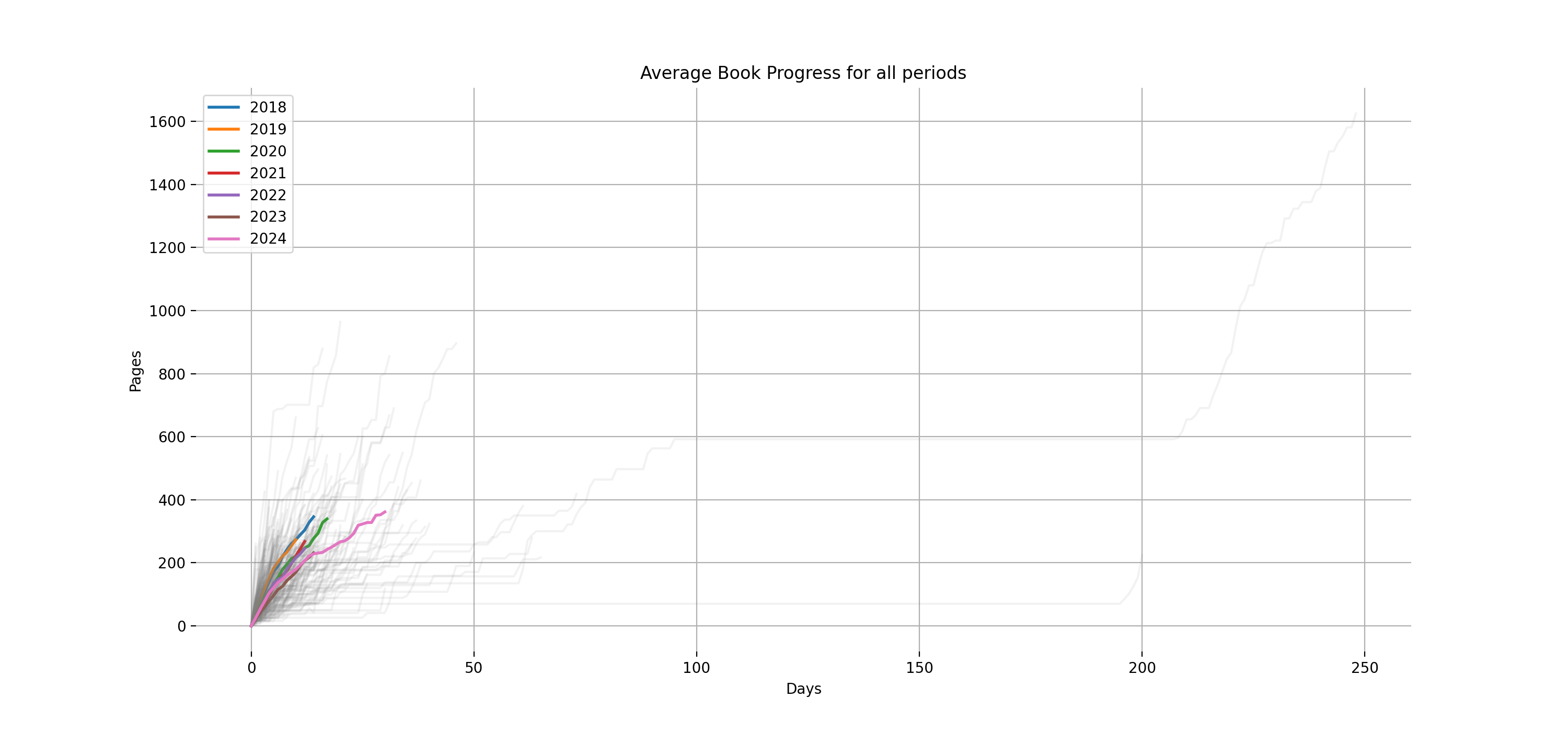
2024
A bit of a reading slump. Mostly due to changes in daily life. Very little public transport, which is usually the hours I plant the seeds for my general desire to finish a book. Oh well. I did read some books I am proud of, like War and Peace. Started the year with it, got about 1/3rd in, then sorta dropped it for a couple months, and then picked it up in August and read the rest. Very enjoyable overall, although certainly not easy reading. It is not technically difficult, but to enjoy it you need to be in a certain state of mind.
27 books, with an average of 312 pages a book, and 31 (!) average days to finish a book. That is average is skewed upwards because oft two books I took long breaks from basically.
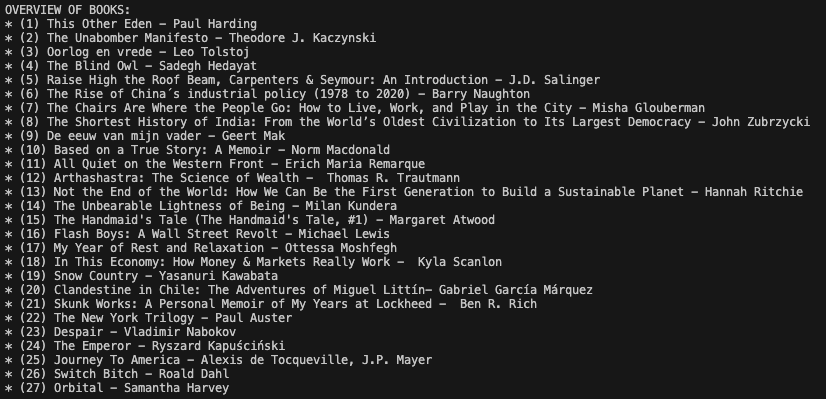
The figures do really show how War and Peace (3, "Oorlog en Vrede" in Dutch) dominated this year of reading.
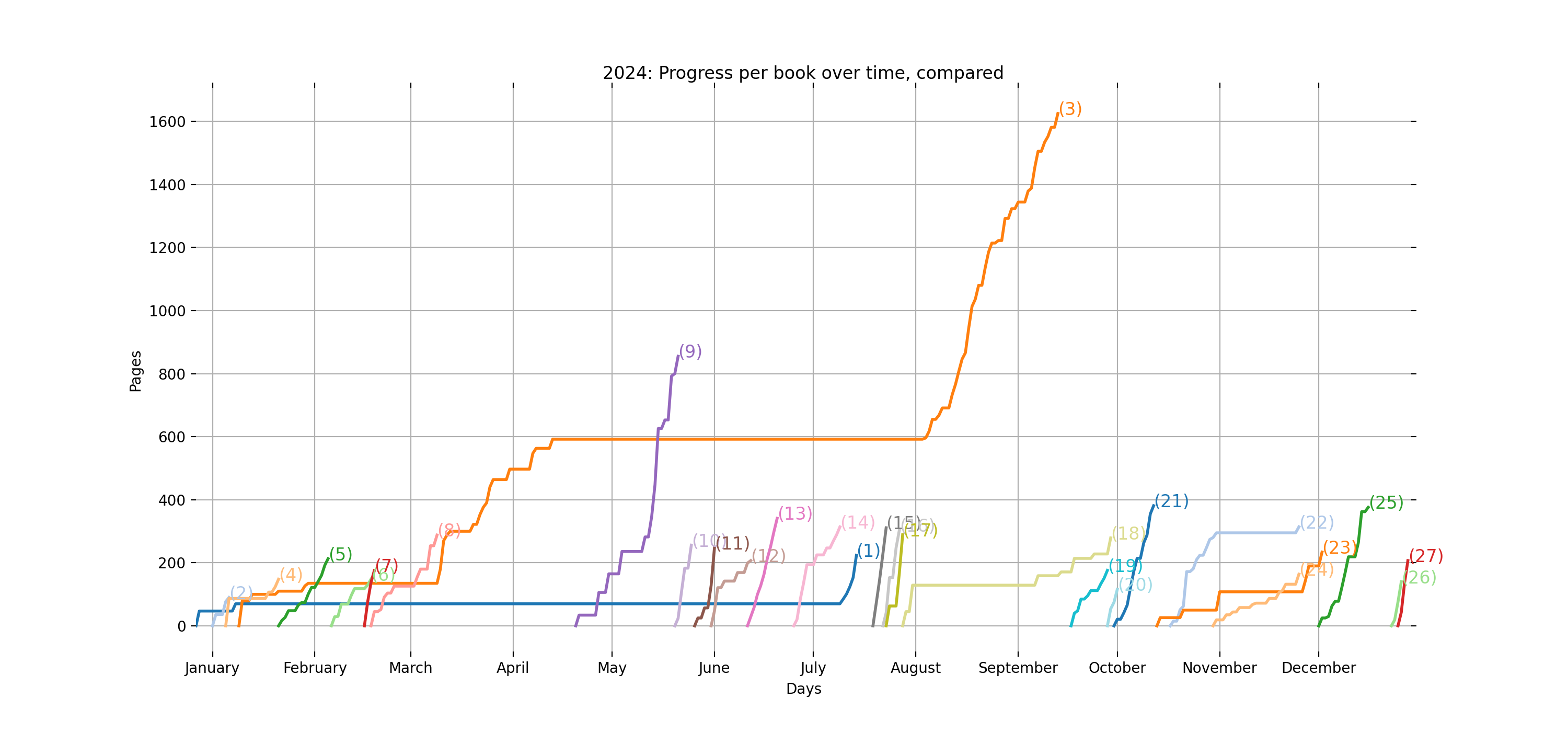
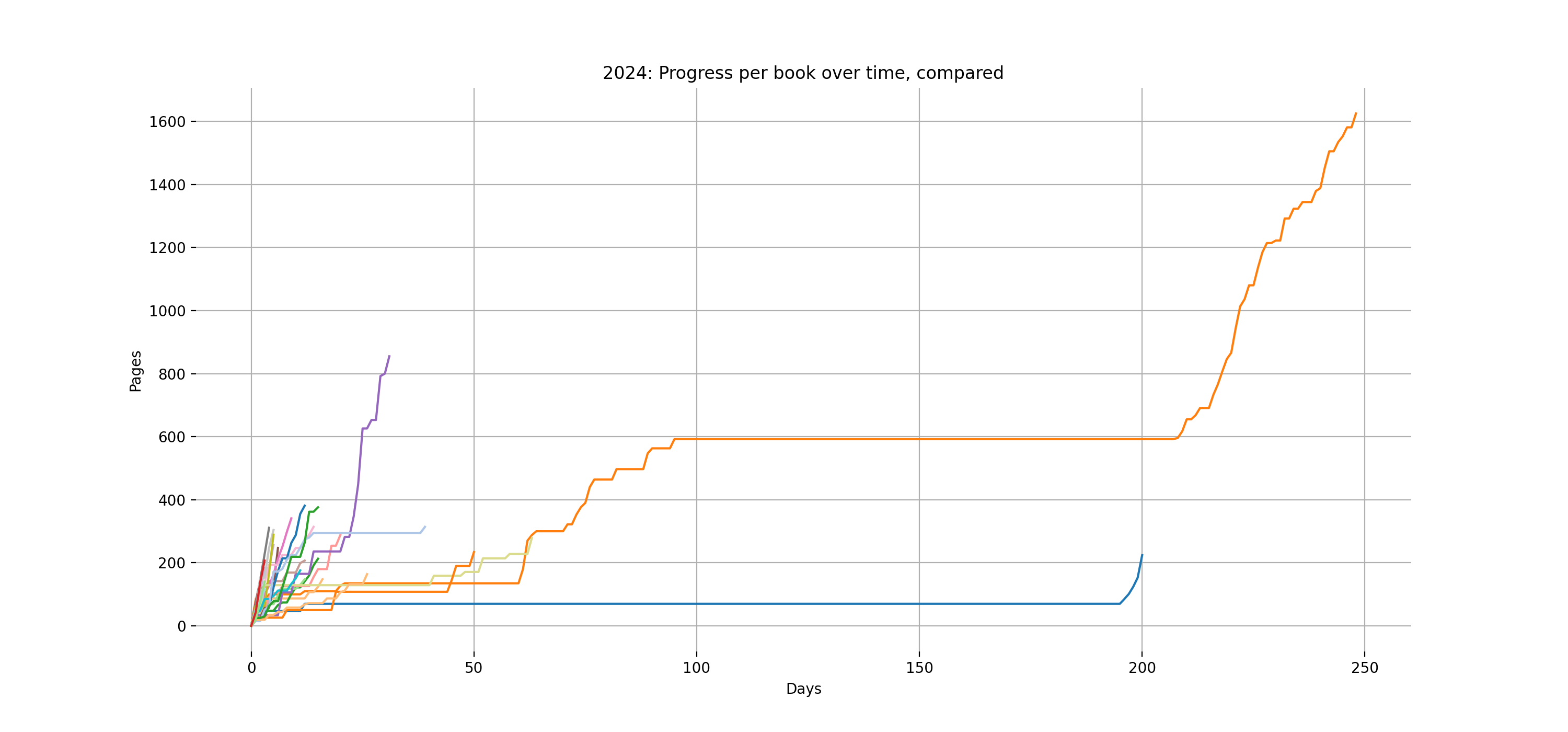
2023
2023 consisted of 37 books, of an average of 293 pages that took me 15.41 days to read, for a total of 10859 pages. Biggest change in reading habit was a more even balance between fiction and non-fiction, and more comfort with reading multiple books at a time. That has always been a bit of a struggle for me, as I tend to just read one book that stays on my mind and that I keep going back to until it is finished. I started writing here and there in the second half of the year, some essays, but writing short stories is especially fun . This probably explains the emphasis on non-fiction.
zFor next year, I want to read at least two long, "bucket-list" books, maybe a Russian and a good biography again (Elon Musk by Isaacson disappointed, this year). I'm moving abroad for 5 months, so I'll probably have some extra alone time.
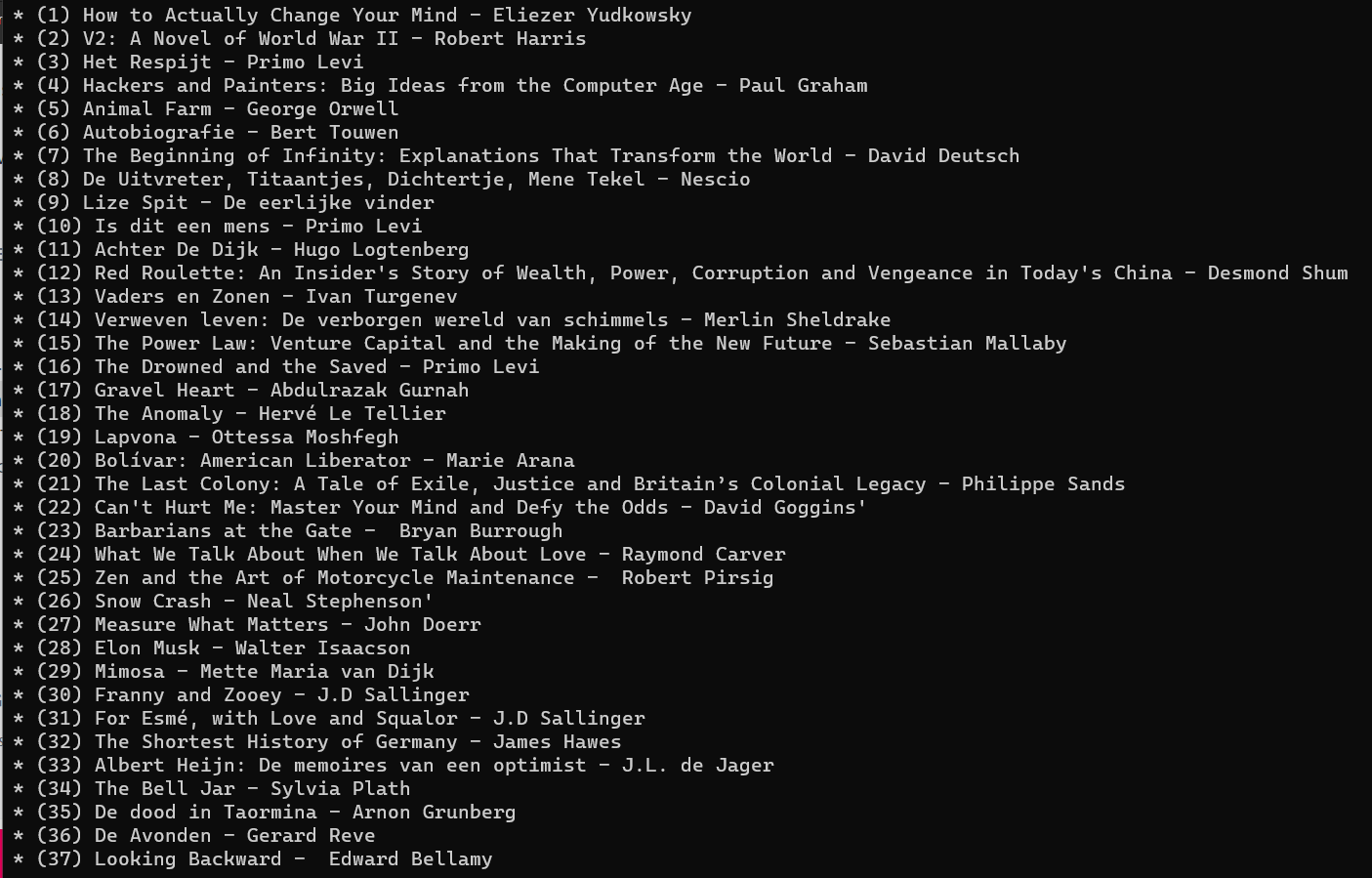
Notable events: Coursework from January-June, July was spent travelling (can you see what book I left at home?), started internships in August and October. Books throughout :)

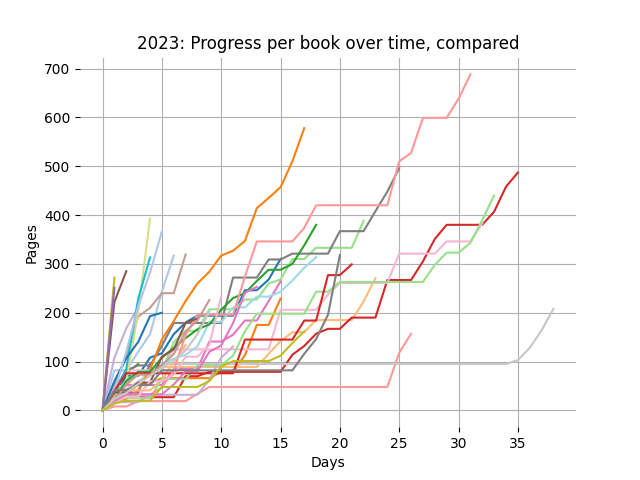
2022
In 2022, I read 35 books for a total of 9572 pages. An average length of 273 pages, and that took me, on average, 13.26 days to read. Set myself the goal to read 35 books, but fell short by just a few days: finished the last book early January. But that is okay, the number of books is a bad proxy for reading activity anyway. If number of books was the end goal, I should've not read the almost 900 page-long Kissinger biography. But it was good though! I read it almost entirely in commute, so I have a visual, engraved in my mind, of the thick book with the pencil in the middle on that small train fold-out table. All-in-all, I am happy with this year of reading. Read a broad range of different genres, 20 non-fiction and 15 fiction. Next year, I want to read a few more "big books" and less short novels and temporary non-fiction. But I don't like to stick to strict To Read lists, reading is a hobby for me, driven foremost by curiosity, and I start books serendipitously. Often the decision to read a 400 page book is as unconsidered as whether to scroll through a blogpost. This is super irrational, a 400 page is approximately 10 hours of reading. Any other commitment of 10 hours will at least involve some cost-benefit analysis. Any rationalization for this precarious selection process (i.e. it promotes finding unknown unknowns, reduces confirmation bias, etc ) are, indeed, rationalizations. The arguments for this selection process might not be less valid, but they are definitely not causal arguments. Whatever.
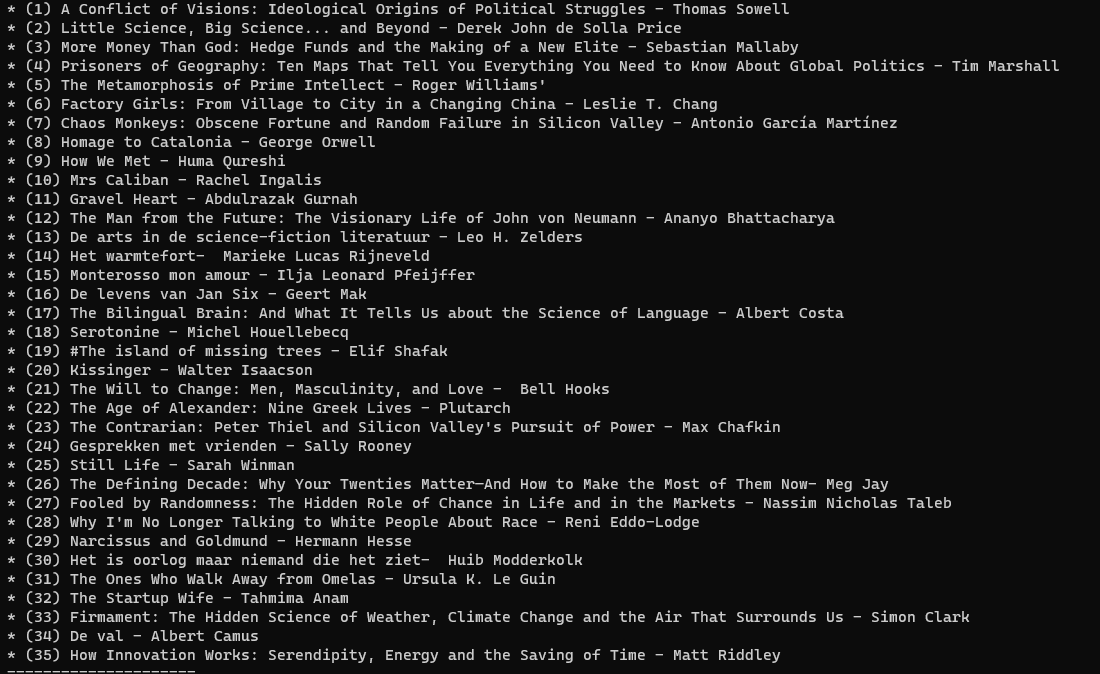
One little surprise about this year's timeline is the uniformity. I had pretty major life changes and they are almost undetectable. This year started with me writing my thesis. End of march I started an internship with a daily two hour commute, up until end of July. In between I moved cities end of April. I went travelling for a month and started at a new university in September. There are definitely some bursts of reading productivity, but I do not see how these correlate with my life phases. Reading has become a "fundamental habit", meaning that it does not rely on other habits. When I started to take reading seriously, I would read almost exclusively on trains. An example of a not-fundamental habit is writing this blog: I do it almost exclusively when I am procrastinating studying.
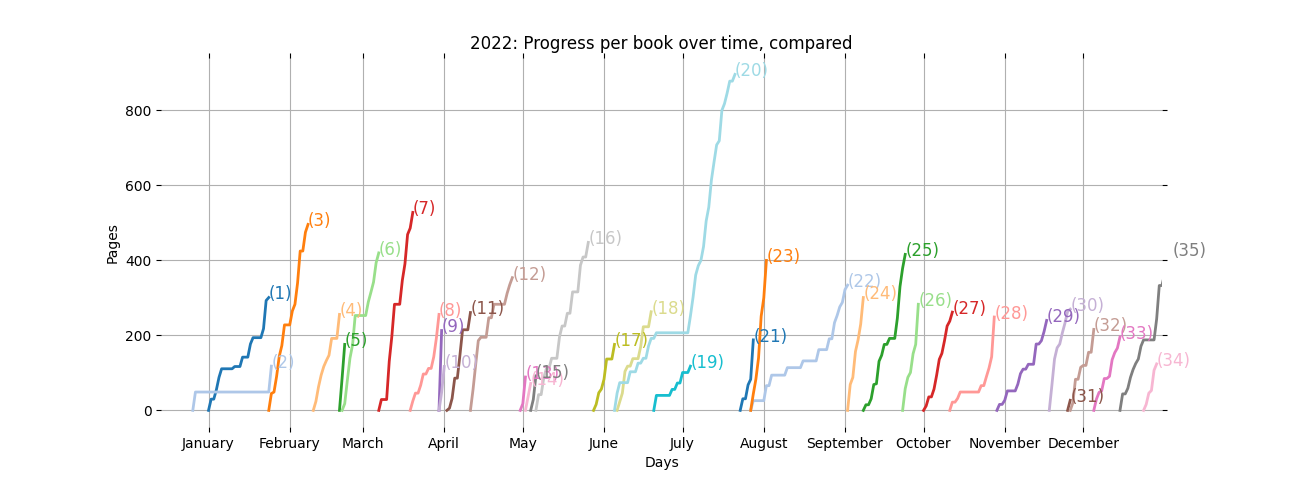
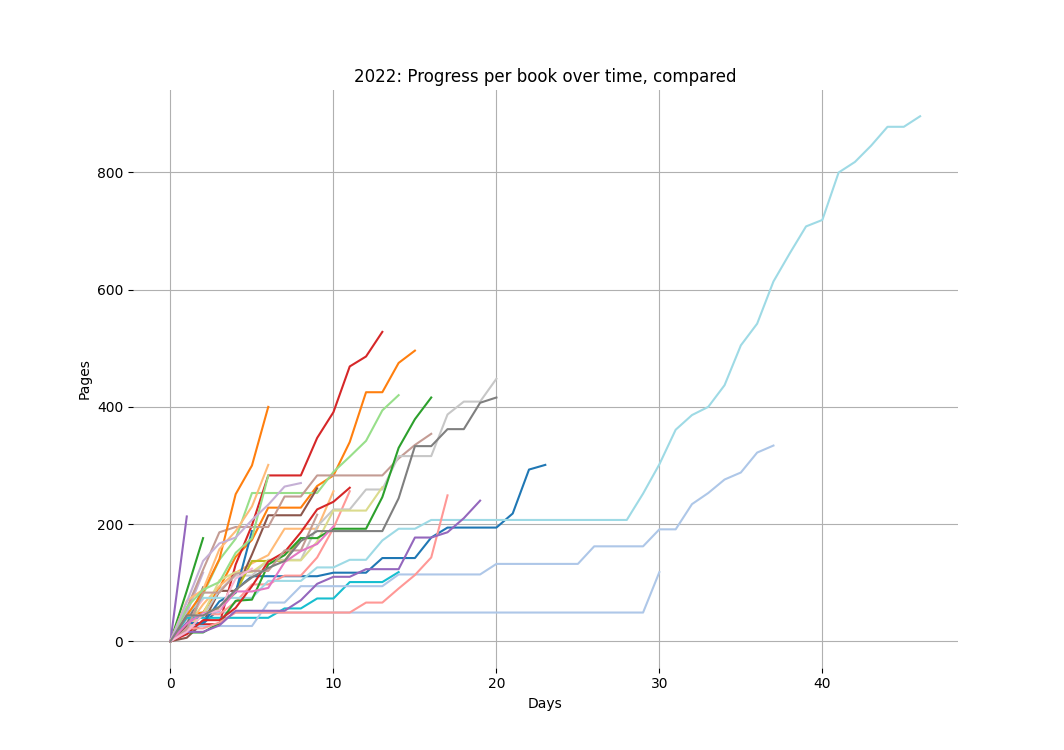
2021
In 2021, I read 37 books for a total of 10087 pages. Considering that just two books more in 2019 made up for twelve thousand pages, I was reading significantly shorter books this year: an average length of just 272 pages, and that still took me, on average, 13.5 days to read.
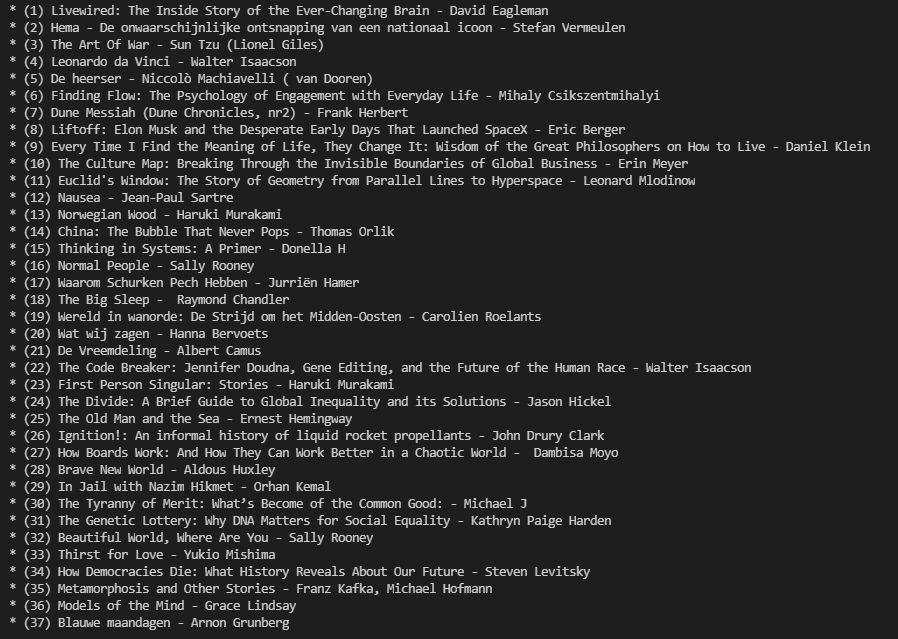
One interesting observation is that I actually read less in the summer, and more during the year. Especially had a strong run from February till July. I know why, we were stuck inside all the fucking time. But the timeline is deceiving, since in July, I spent some time reading The Craftsman by Richard Sennett, which I put down after two months. I do not plot my DNF's so that's why. Still happy I didn't torture myself through the second half of that book though.
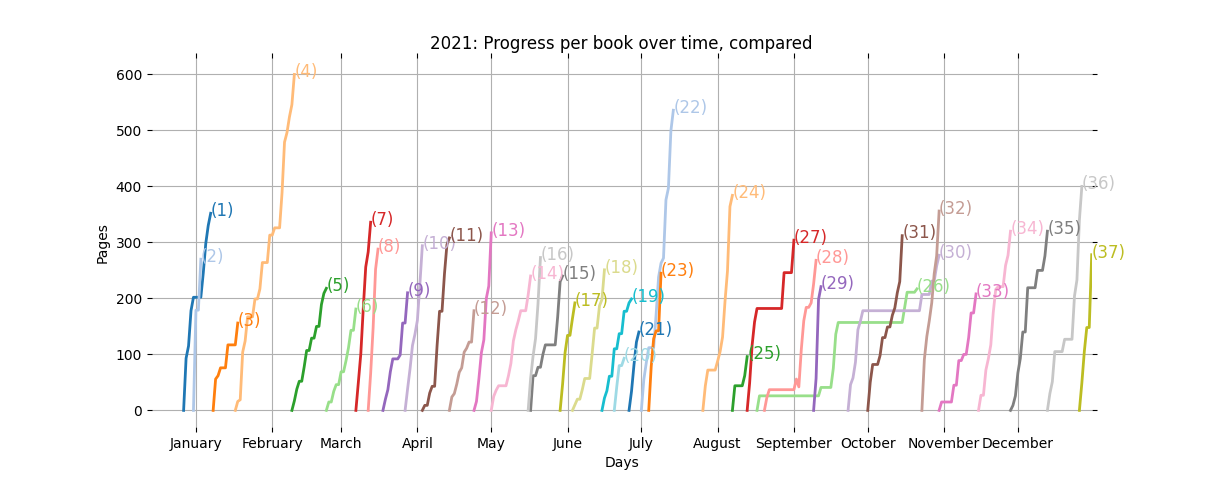
Another thing I tried was reading multiple books at the same time, see August and September. Mixed results, I was basically just slowly reading one book, and then quickly reading other books in between. Still need to get better at that. You can see the slow book, which took me more than two months, as a clear outlier below. The book is Ignition! by John Clark, a history of rocket propellants. It was fun, but definitely not a page turner.
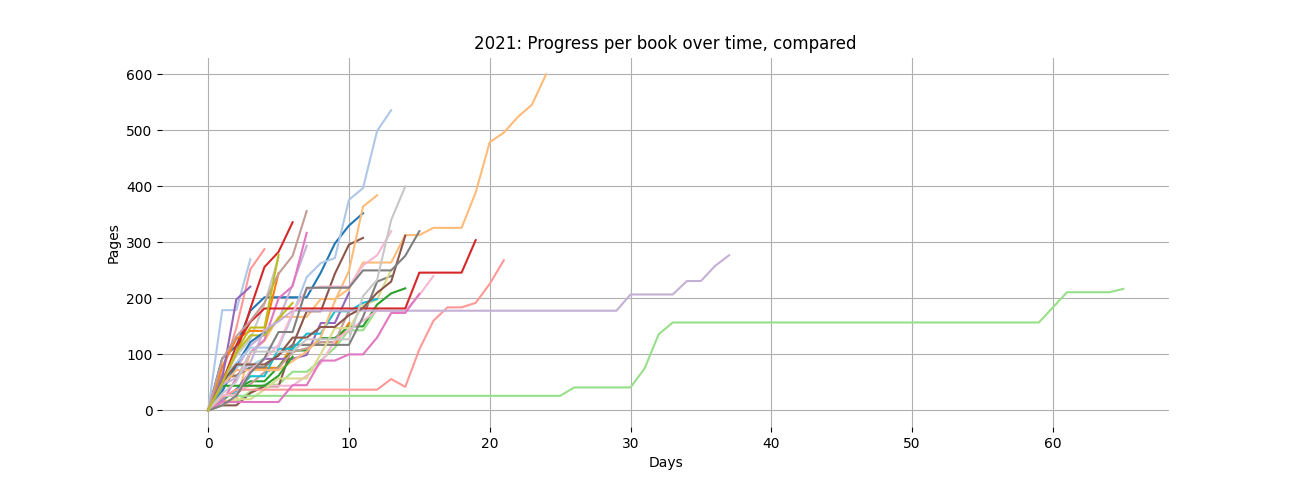
2020
In 2020, I enjoyed 24 books good for 8318 pages. That is a slide back from 2019. Still, I was happy to have read some more pretentious books. That put the average length a bit higher, at 346 pages, which took me an average of 18 days to finish.
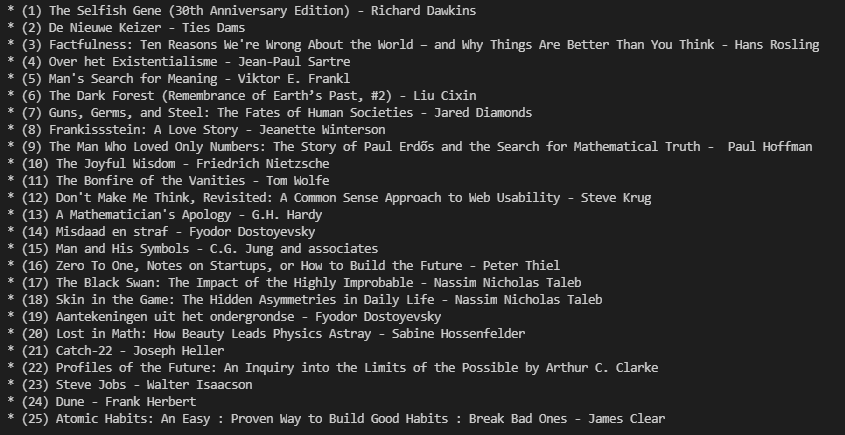
Interestingly, as that one viral disease settled into daily life, it put the brake on my reading habit. I was still reading, but not that much, and also getting very little enjoyment out of it. Early February, I was taking a uni course for which I had to read all these lengthy Intellectual Property papers. As I study mathematics, I am not used to reading for my study, so it took up the time I would normally spend on books I actually enjoy. If I ever make something of significance, I will probably just give it away, so that I do not have to deal with the boring world that Intellectual Property Rights is.
Related to that respiratory disease that, surprisingly then, had not disappeared in the summer, I did not go on a trip that summer. Instead I worked, and that made for a summer with no extra reading. Sad really.
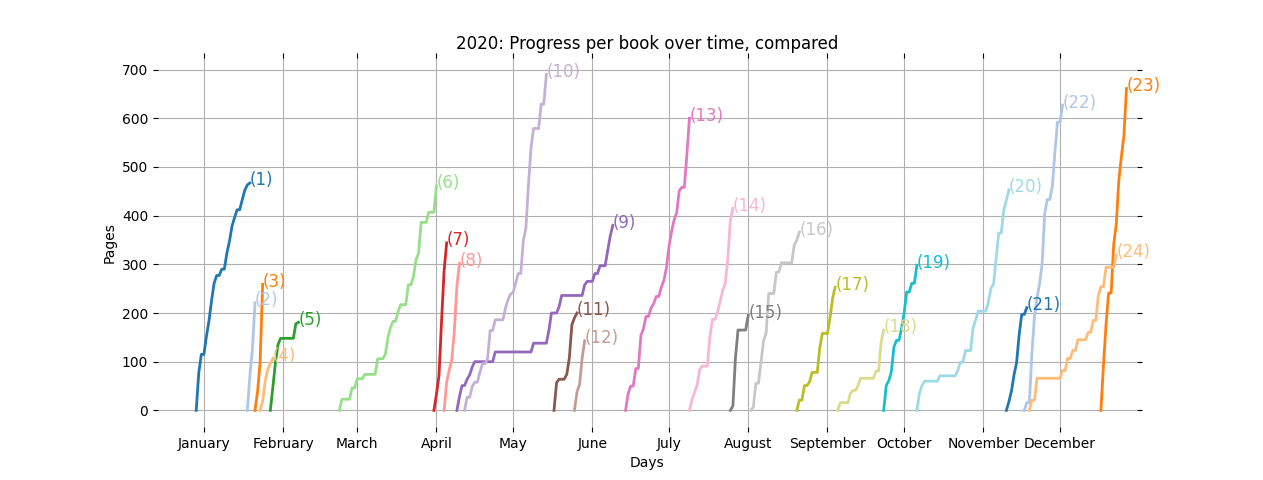
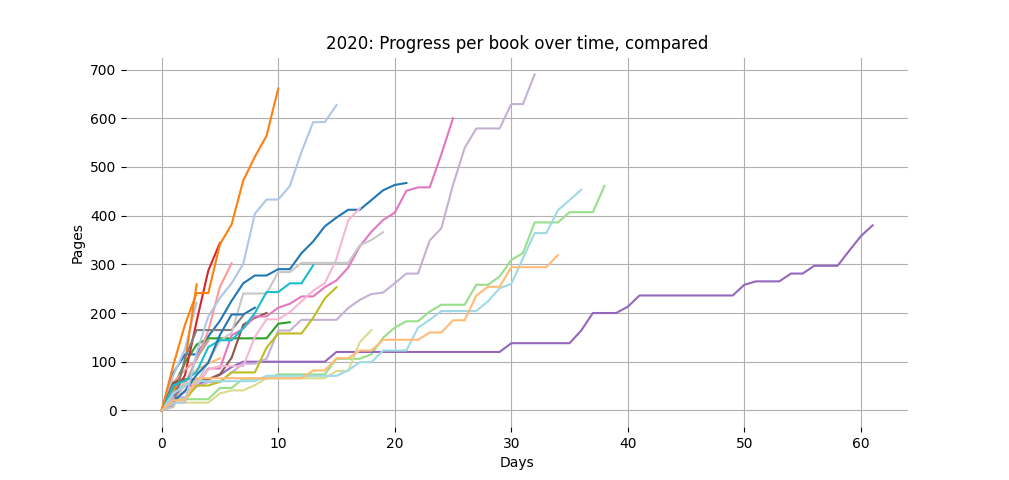
2019
In 2019, I read 37 books, good for 12145 pages. Compared to other years, I guess you could say I was especially boring in this one. It was even before the pandemic! Really should've spent more time getting drunk. Instead I read over twelve thousand pages. What a waste. Anyway, the average book length was 328 pages, read over the course of, on average, 12 days.
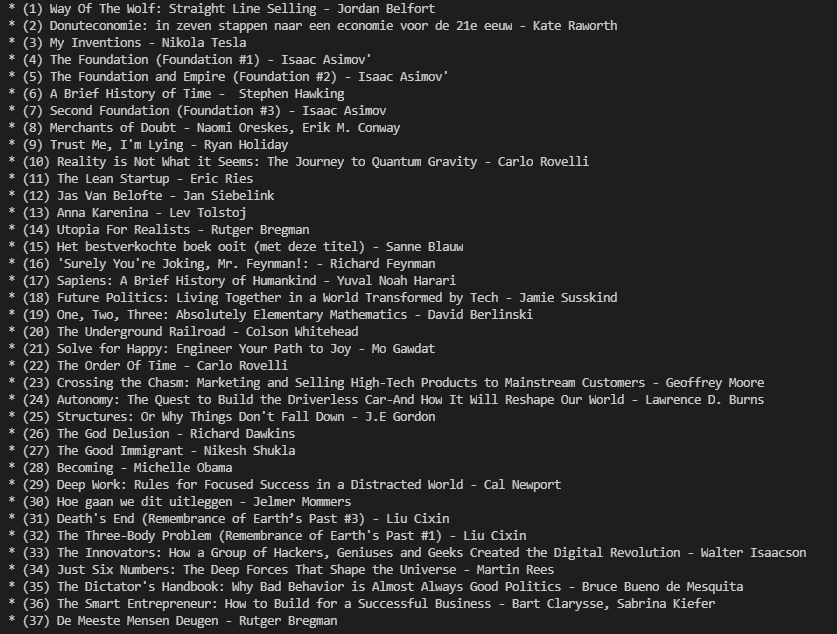
As you can see below, it was helped by a solid summer From end of july till half way of august, I went camping for almost three weeks with my parents and brother. Once you get tired of talking to each other, you read books. This happened rather quickly, but I still have fond memories of this summer. Especially reading The God Delusion and pesking my parents with all this existential crap and how awful organized religion. I've come around since then. I am still not religious, but it is not the purest evil. It is honestly a miracle my family did not sew my tent shut that summer. Jokes aside, I also read some other great books that summer. Both Structures by J.E. Gordon and The Good Immigrant by Nikesh Shukla opened my eyes to a new perspective. The former on static mechanics, the latter on growing up as an immigrant.
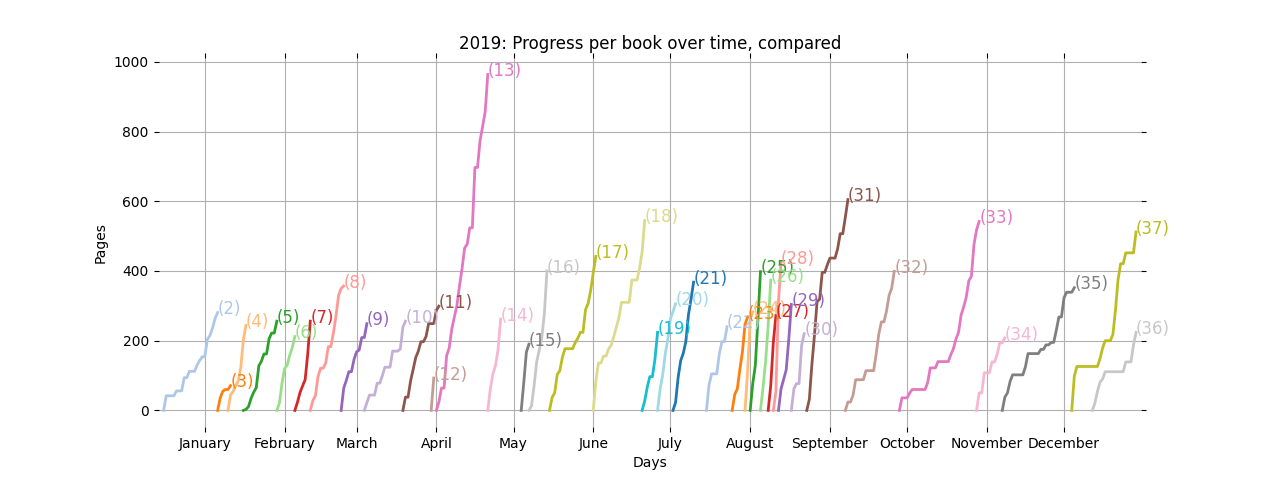
Additionally, I was just very consistent this year. The longest time it took me to finish a book was only one month, Innovators, by Walter Isaacson. I have read almost all books by Isaacson by now, and although packed to the brim with content, I enjoyed it the least. Maybe because of lack of novelty, maybe because his other biographies always include a lot of detours that keep it fresh. Innovators not so much, as the core subject is a lot to cover anyway.
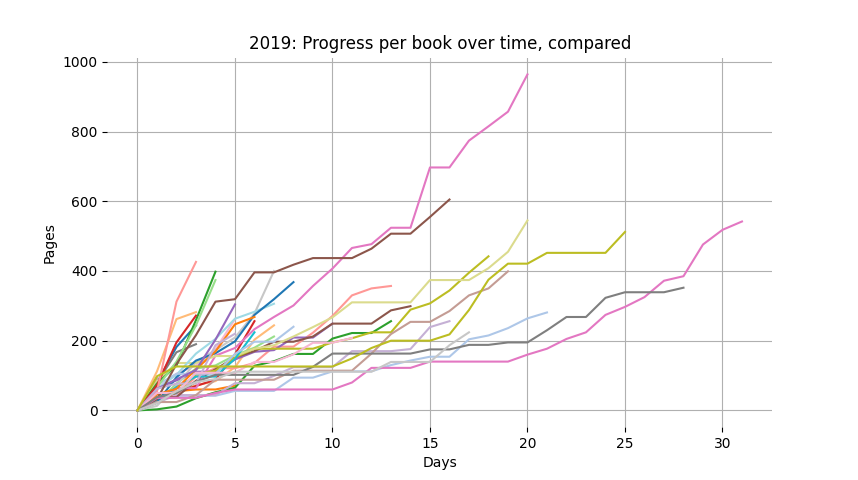
2018
2018 was the first time I started tracking my reading, with the goal of motivating myself to keep it up a bit more. Read 25 books, with an average of 305 pages. That makes for 7645, with an average reading time of 14 days per book.
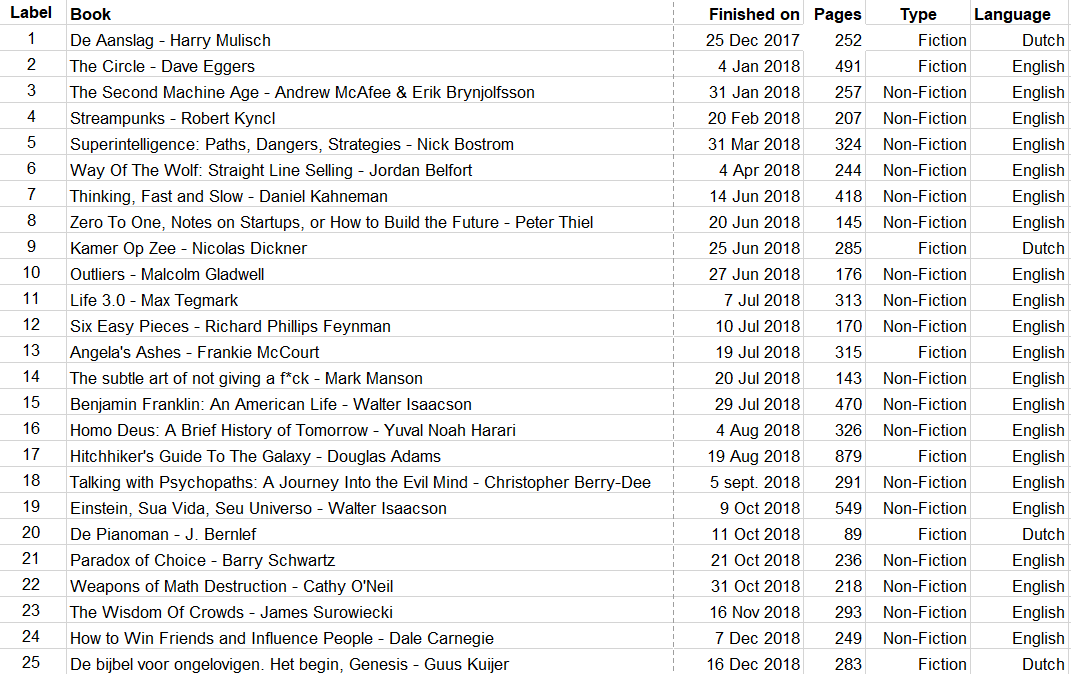
What stands out below, in the year summarized, is the busy summer, and the lack of any reading in the months leading up/during my high school final exams. Three weeks camping with the family really had me looking for distractions. I don't think I've ever managed to read as many pages as when I read the entire five part trilogy of the Hitchhiker's Guide To The Galaxy in like 3 days. Wild.
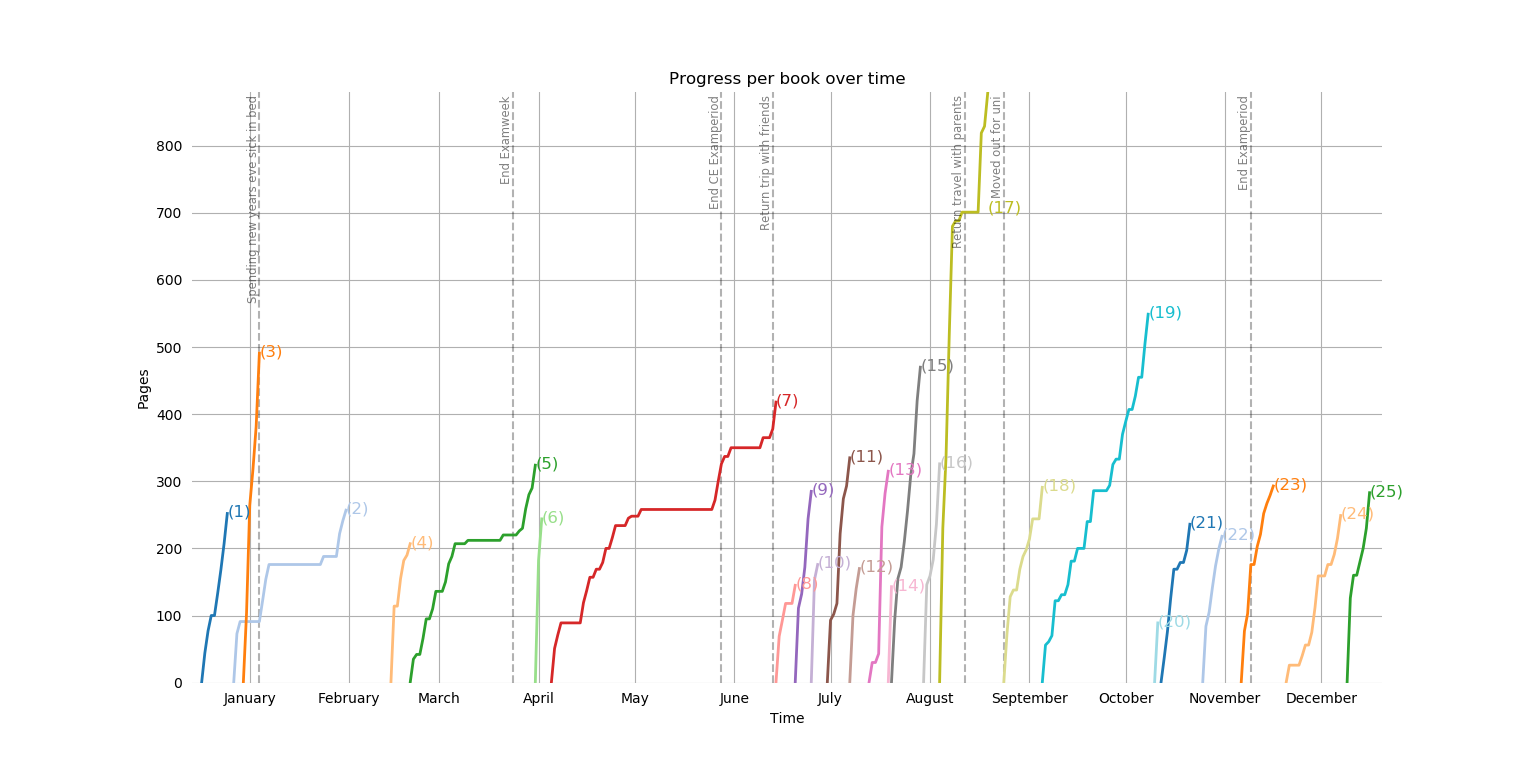
Notably in the individual books' trajectories is (7), Daniel Kahneman's classic, Thinking, Fast and Slow. It is one of my favorite books of all time, and I was rereading it at this point. So despite my slow progress, you should definitely read it, at a leisurely pace. Read a chapter a day, and google whether the research he mentioned failed to replicate too.
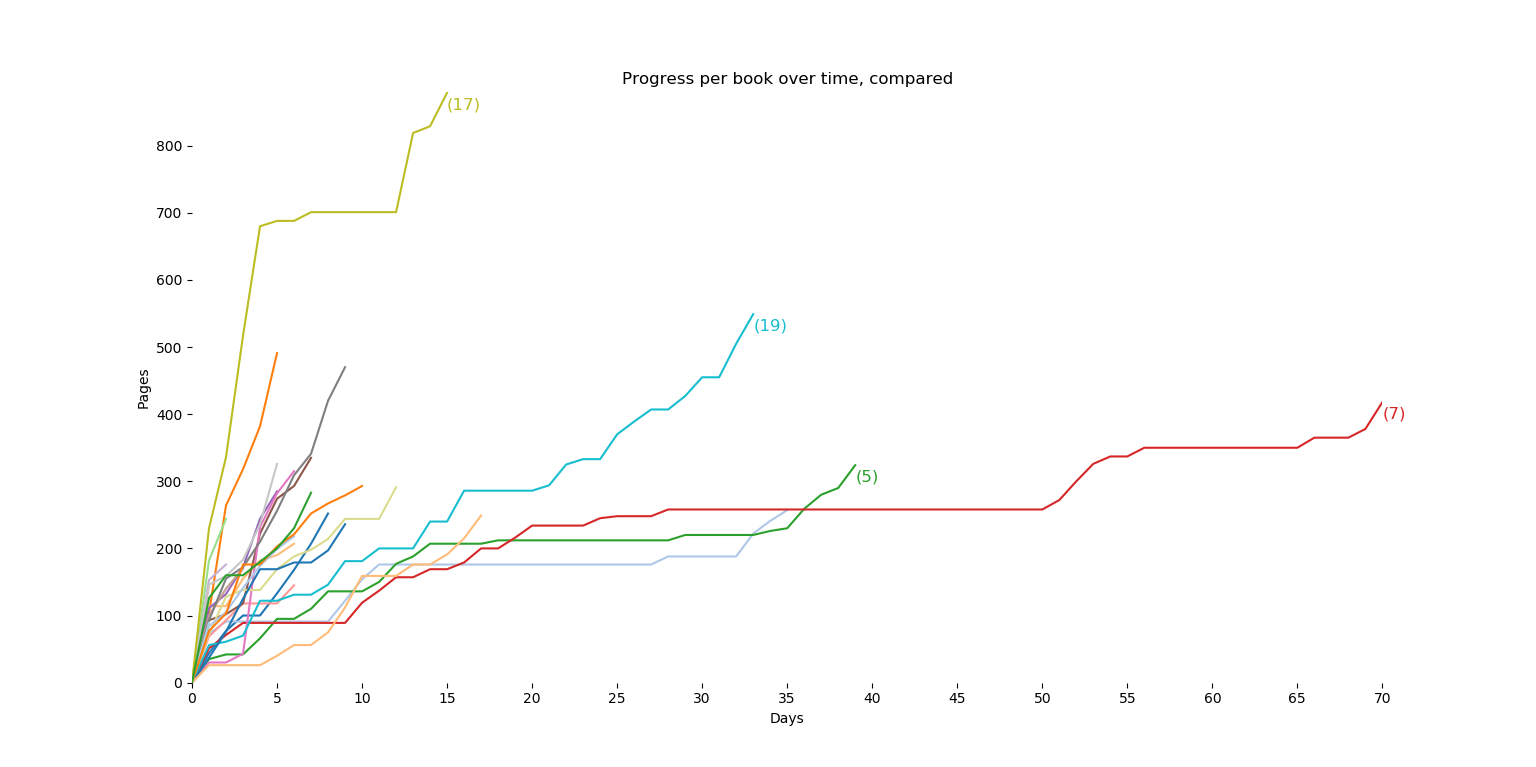
The graph below really is boring. But ah well. Arguably, they all are. At least it is black-and-white, which qualifies it as being aesthetic.
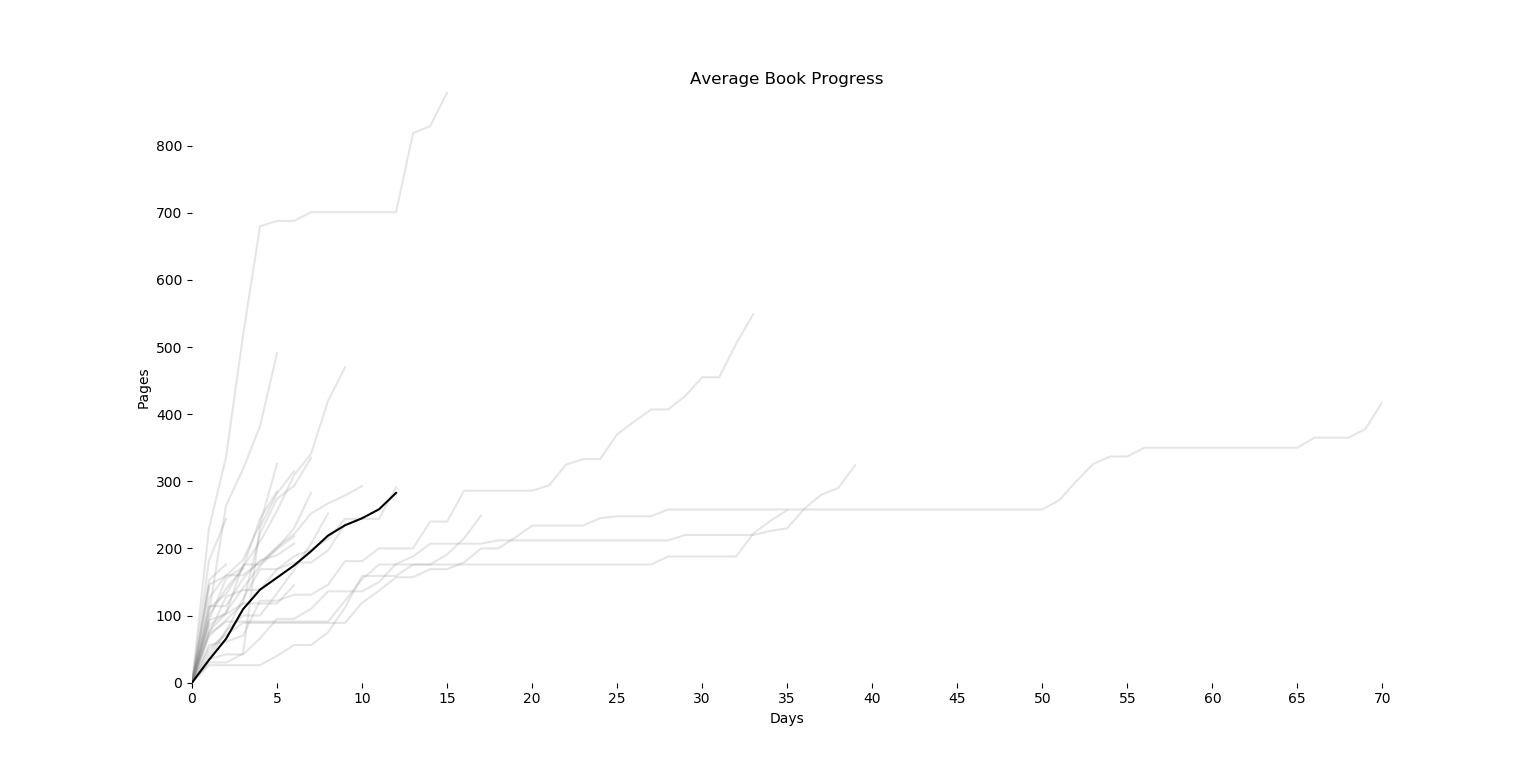
© 2024 Lourens Touwen